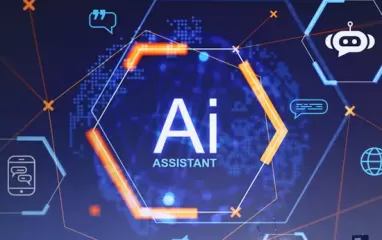Other recent blogs


Let's talk
Reach out, we'd love to hear from you!
AI is impacting every industry out there. And software development is no exception - From how project requirements are gathered to how an application is designed, built, deployed, and managed, every stage in the software development lifecycle is rapidly undergoing changes. There is even a report indicating that generative AI could lead to a 10-fold increase in coding productivity.
To build digital products at the speed of business and craft memorable customer experiences, it is vital for organizations to keep tabs on the increasing usage of intelligent technologies in the field of Software Development. Here are some of the best ways you can leverage AI/ML tools and technology to drive innovation and gain a competitive edge.
The rise of AI in Software Development: 5 ways it's transforming the industry

- Precise estimates: When a project is not delivered on time and within budget, it leads to increased customer dissatisfaction and loss of repeat business. And it’s not just about the customer and business revenue; failing to meet the expectations of the customer also hurts the morale of the development team, and the sentiment is likely to impact their performance in future projects.
However, thanks to modern artificial intelligence software, project managers and software development teams are now able to make more informed decisions about project timelines and budgets. This capability leads to more accurate estimates, better project planning, and a dramatic improvement in customer satisfaction.
To develop the capabilities in terms of predicting estimates that are closer to reality, teams can train AI/ML models on historical data related to projects that were delivered in the past. By analyzing data related to team sizes, project timelines, and task complexity, the models can generate highly accurate estimates for new projects.
- Efficient prototyping with artificial intelligence: Delay in demonstrating proposed solutions with prototyping solutions like an MVP (minimum viable product) makes clients lose their trust and interest in signing up with a service vendor, which can lead to loss of business or significant delays in project kick-offs and contract signings. It is because building a prototype for a client can be time-consuming and complex.
This is where intelligent technologies, such as AI and ML, can play a significant role. AI-enabled tools can help accelerate the process, and solution architects can easily and effectively map business functionalities into technical prototypes. The work that might take days or weeks can be done in a matter of minutes or hours. Access to this capability to build prototypes at such a faster pace can help reduce sales cycles, increase business revenue, and achieve greater customer satisfaction.
- Programmers are able to write less and produce more: Writing neat and clean code takes experience and time. With AI-powered code completion tools, software engineers can write code at the speed of business and thus ship products faster to the market.
OpenAI Codex, CodeT5, Cogram, Polycoder, and Tabnine are some of the most popular and efficient code-generation tools that empower developers to write code faster and productively in a range of different environments and languages such as VS Code, JetBrains, Ruby, Swift, PHP, and JavaScript. Most of these artificial intelligence software tools are powerful as they have been trained with billions of code lines available across the public domain, including GitHub repositories.
Automated code generation is no less than a transformative capability that will redefine the role of software engineers in the near future and, furthermore, enable them to dedicate more of their time and expertise to more meaningful activities.
- AI is automating much of the software testing landscape: Rigorous testing is critical to building and shipping software products that perform on functionality, performance, and security.
However, manual testing is time-consuming, expensive, and has a broader scope for manual errors. All of these can adversely affect the speed and quality of software releases in the market and customer experience.
However, with new-age artificial intelligence software testing tools, such as Deep Exploit and TestCraft, software testing teams can create more comprehensive and productive test cases and automate test runs on the codebase.
In essence, AL/ML tools can help expedite the process of software testing with the following:
a. Identifying and generating new and more comprehensive test cases
b. Analyzing and auditing current test cases for their effectiveness
- Faster deployment leading to increased customer satisfaction: Thorough testing ensures that only high-quality software code is released in production. However, there is still a range of issues that can be identified only when the application is deployed in the target environment.
The good news is that software engineers can predict deployment failures by analyzing the data from prior code releases and application logs via AI-powered tools. By accessing and analyzing past data and software analytics, AI-powered assistants can learn from experience and identify common errors.
Early identification of these bugs in the development phase can greatly mitigate the need for rollbacks. Artificial intelligence technology can also be used by operations teams in the post-deployment phase to identify and fix issues to keep enhancing the user experience.
Industry-leading AI tools in Software Development
Both start-ups and established vendors are launching new and improved AI tools to drive automation and innovation across the software development lifecycle. However, ChatGPT and Copilot are among the most prominent tools in the field that are already redefining the future of software development.
1. ChatGPT: ChatGPT has been trained in at least 95 natural languages. Moreover, ChatGPT is capable of processing requests with programming languages such as Python development, JavaScript, PHP, HTML, Go, and Swift. While ChatGPT features are impressive, ChatGPT's content generation is not autonomous-safe yet; it is best to be utilized as a productivity tool instead of being seen as a complete replacement for a programmer.
Here are five ways ChatGPT enables coders to improve their productivity:
- Technical assistance: Solves queries related to programming languages, libraries, frameworks, etc.
- Code optimization: Can review code and recommend suggestions to identify and fix bugs and improve overall functionality.
- Learning resources: ChatGPT can act as a mentor and recommend valuable resources that programmers can use to improve their coding skills and become more valuable to their organizations.
2. GitHub Copilot: Trained on billions of lines of code available in public GitHub repositories, GitHub Copilot acts as an AI pair programmer that assists in writing code faster. The AI system uses the OpenAI codex to help with code by offering autocomplete-style suggestions right within the editor.
One outstanding feature of GitHub Copilot is its ease of suggesting code in all languages available in the public repositories. However, the accuracy of the code depends on the training data the tool has been fed. So, languages with less representation in public repositories may produce fewer or less robust code suggestions. Since JavaSript is well-presented across public repositories on the web, programmers will experience better support while coding in JavaScript.
AI and Software Development: A promising partnership for future innovations
The steady introduction of AI technology in software development is transforming the entire digital landscape. Automation of time-consuming tasks that are repetitive in nature across the software development lifecycle and the new-found capabilities to write code faster and run test cases automatically are enabling teams to deploy faster and gain a competitive advantage in today’s hypercompetitive marketplace.
It is clear that AI is set to play a crucial role in the future of software development. AI tools, such as ChatGPT and GitHub Copilot, continue to advance. We can expect even more innovative applications that will further revolutionize the industry. At Kellton, we believe in the potential of AI to transform software development and help our clients build highly agile and robust digital solutions. To learn about our AI/ML capabilities and services, please visit us here. If you want to contact our team to help you on your next development project, see us here.




